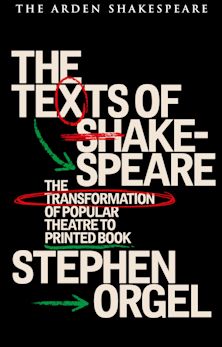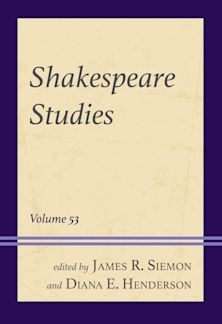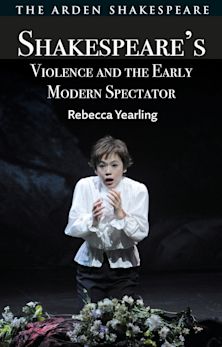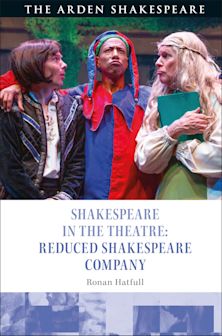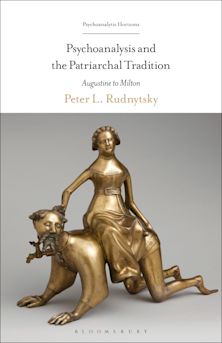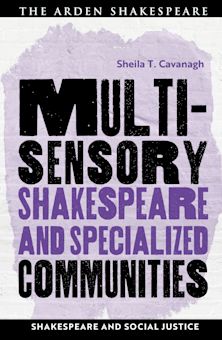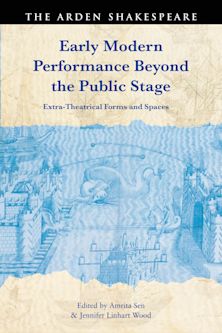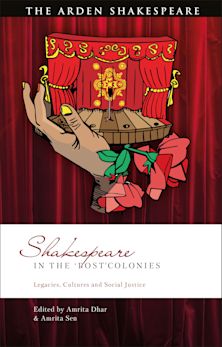- Home
- ACADEMIC
- Literary Studies
- Shakespeare Studies
- Shakespeare's Political Pageant
Shakespeare's Political Pageant
Essays in Politics and Literature
Joseph Alulis (Anthology Editor) , Joseph Alulis (Contributor) , Dennis Bathory (Contributor) , Paul A. Cantor (Contributor) , Christopher Colmo (Contributor) , Michael Davis (Contributor) , Timothy Fuller (Contributor) , Pamela K. Jensen (Contributor) , David Lowenthal (Contributor) , Tim Spiekerman (Contributor) , Vickie Sullivan (Contributor) , Barbara Tovey (Contributor) , Michael Zuckert (Contributor)
Shakespeare's Political Pageant
Essays in Politics and Literature
Joseph Alulis (Anthology Editor) , Joseph Alulis (Contributor) , Dennis Bathory (Contributor) , Paul A. Cantor (Contributor) , Christopher Colmo (Contributor) , Michael Davis (Contributor) , Timothy Fuller (Contributor) , Pamela K. Jensen (Contributor) , David Lowenthal (Contributor) , Tim Spiekerman (Contributor) , Vickie Sullivan (Contributor) , Barbara Tovey (Contributor) , Michael Zuckert (Contributor)
This product is usually dispatched within 3 days
- Delivery and returns info
-
Free CA delivery on orders $40 or over
You must sign in to add this item to your wishlist. Please sign in or create an account
Description
Literary works, through their very personal means of characterization, reveal the direct effect of politics on individuals in a way a political treatise cannot. The distinguished contributors to this volume share the belief that Shakespeare is the author who most effectively sets forth the multifarious pageant of politics. Shakespeare's rich canon presents monarchy and republic, tyrant and king, thinker and soldier, and Christian and pagan. The twelve essays in Shakespeare's Political Pageant discuss a broad range of Shakespeare's dramatic poetry from the perspective of the political theorist. This innovative book demonstrates the immense value of seeing Shakespeare's plays in the context of political philosophy. It will be an important source for students and scholars of both political science and literature.
Table of Contents
Chapter 2 Acknowledgments
Part 3 Part I: Comedies
Chapter 4 The New Medea: On Portia's Comic Triumph in The Merchant of Venice
Chapter 5 Fathers and Children: Matter, Mirth, and Melancholy in As You Like It
Chapter 6 Wisdom and the Law: Thoughts on the Political Philosophy of Measure for Measure
Chapter 7 The Portrait of Athens in A Midsummer Night's Dream
Part 8 Part II: Histories
Chapter 9 Coming Home: The Political Settlement in Shakespeare's King John
Chapter 10 The Education of Hal: Henry IV, Parts One and Two
Chapter 11 Princes to Act: Henry V as the Machiavellian Prince of Appearance
Part 12 Part III: Tragedies. "This is Venice": Politics in Shakespeare's Othello
Chapter 13 King Lear: The Tragic Disjunction of Wisdom and Power
Chapter 14 The Relation of Thought and Action in Macbeth
Chapter 15 Courage and Impotence in Macbeth
Chapter 16 "With Himself at War": Shakespeare's Roman Hero and the Republican Tradition
Chapter 17 Index
Product details
| Published | Aug 30 1996 |
|---|---|
| Format | Paperback |
| Edition | 1st |
| Extent | 304 |
| ISBN | 9780847682904 |
| Imprint | Rowman & Littlefield Publishers |
| Dimensions | 229 x 152 mm |
| Publisher | Bloomsbury Publishing |
About the contributors
Reviews
-
This superb collection of essays on Shakespeare's plays combines rich analysis of dramatic detail with insight into political rule, ambition, and love. By illustrating universal themes in particular political and historical contexts, ^RShakespeare's Political Pageant^I demonstrates Aristotle's claim that poetry is more philosophic than history. Alulis and Sullivan have given us a major contribution to the growing field of politics and literature.
Mary P. Nichols, Emerita Professor of Political Science at Baylor University
-
Diverse as these essays are in many respects, they are alike in their assumption that Shakespeare's understanding of human things is inseparable from his understanding of politics. The authors succeed in making Shakespeare's political wisdom manifest because they perceive that the plays convey his knowledge not in isolated speeches but through action and speech so concerted as to guide us through a dramatic argument.
John Alvis, professor and director, American Studies Program, University of Dallas
-
. . . each essay contributes to the reader's understanding of Shakespeare's view of human life in its various endeavors.
Perspectives on Political Science
-
In every case the close reading is beautifully subordinated to the major claim of the essay. Because diverse details anyone who teaches these plays or directs them on stage will appreciate this collection's emphasis on formal coherence.
Ian MacInnes, Shakespeare Quarterly
-
The essays . . . interpret Shakespeare's plays in refreshingly broad contexts of political philosophy rather than within the comparatively narrow limits of politics defined by cultural materialists and new historists. The collection offers at once spacious and penetrating readings.
Arthur Kirsch, University of Virginia













